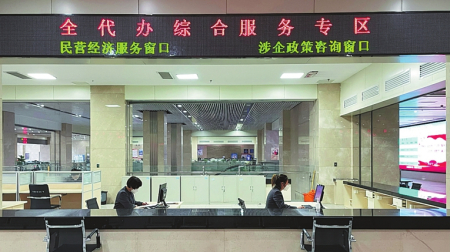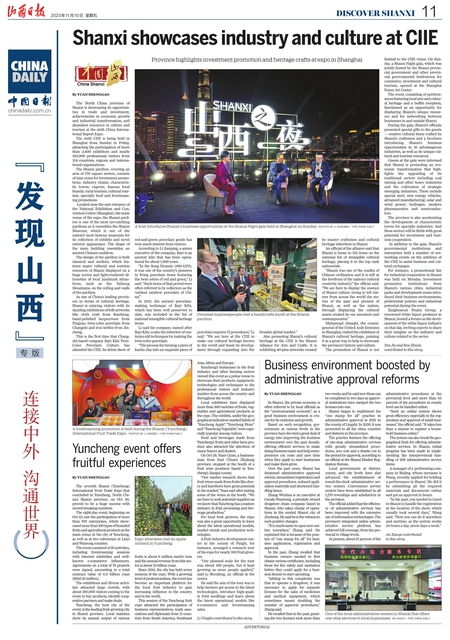Business environment boosted by administrative approval reforms

One of the local administrative centers in Shanxi that offers one-stop services to local businesses. An Xiaoyi/For China Daily
In Shanxi, the private economy is often referred to by local officials as the "environmental economy", as a good business environment is crucial for its existence and growth.
Based on such recognition, governments at various levels in the province have devoted a great deal of energy into improving the business environment over the past decade, offering efficient services to make doing business easier and help entrepreneurs cut costs and save time when they apply to start businesses and make them grow.
Over the past years, Shanxi has deepened administrative approval reform, streamlined registration and approval procedures, reduced application materials and shortened handling times.
Zhang Wenhua is an executive at Guoda Wanming, a privately owned drugstore chain company based in Shanxi, who takes charge of operations in the central Shanxi city of Jinzhong. He said he is the witness to such positive changes.
"It is much easier to open new outlets nowadays," Zhang said. He explained this is because of the practice of "one stamp for all" for business application, registration and approval.
In the past, Zhang recalled that business owners needed to first obtain various certificates, including those for fire safety and sanitation before they could apply for a business license to start operating.
"Adding to this complexity was that to operate a drugstore, it was necessary to apply for separate licenses for the sales of medicines and medical equipment, which sometimes meant doubling the number of approval procedures," Zhang said.
He recalled that in the past, granting the two licenses took more than two weeks and he said now these can be completed in two days as approval institutions have merged the two licenses into one.
Shanxi began to implement the "one stamp for all" practice in administrative approval in 2016 in the county of Lingshi. In 2020, it was promoted to all the cities, counties and districts in the province.
The practice features the offering of one-stop administrative services with greatly streamlined procedures, zero cost and a drastic cut in the period for approval, according to an official at the Shanxi Market Regulation Bureau.
Local governments at district, county, and city levels have also advanced the establishment of round-the-clock administrative service centers. Convenience service centers have been established in all 1,276 townships and subdistricts in the province.
The official added that the efficiency of administrative services has been improved with the extensive use of information technologies. The province's integrated online administrative service platform has achieved full coverage, from the provincial to village levels.
At present, about 91 percent of the administrative procedures at the provincial level and more than 83 percent of the procedures at county level can be handled online.
"Such an online system shows great efficiency, especially in the registration and approval of small businesses," the official said. "It takes less than a minute to register a household business online."
The system can also break the geographical limit for offering administrative services. In Shanxi, initial progress has been made in implementing the interprovincial handling of 209 administrative service items.
A manager of a performing company in Beijing, whose surname is Wang, recently applied for holding a performance in Shanxi. He did it by submitting all the required materials and documents online and got an approval in hours.
"In the past, you needed to travel to Shanxi to handle the registration at the location of the show, which usually took several days," Wang said. "Now you can do it anywhere and anytime, as the system works 24 hours a day, seven days a week."
By Yuan Shenggao
An Xiaoyi contributed to this story.











